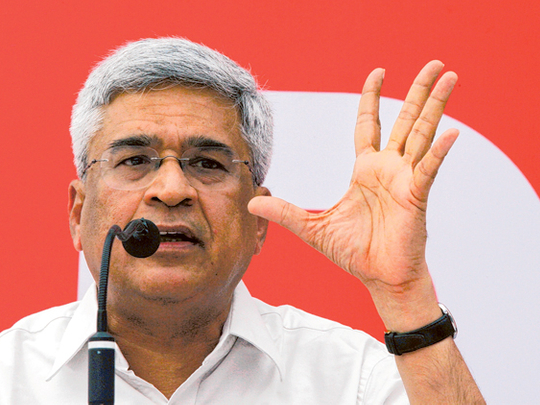
Dubai: From being elected as the president of the students’ union at India’s premier Jawaharlal Nehru University in the early 1970s to taking over the reins as the general secretary of the Communist Party of India – Marxist (CPM) in 2005, Prakash Karat is one name that has always been part of the DNA of secular, Left politics in India.
It was at his behest that CPM withdrew support from the Congress-led United Progressive Alliance (UPA) government at the Centre over the India-US nuclear power deal in 2008 — a decision that had raised serious doubts about the pragmatics of Left politics in India.
More recently, his bid to forge an electoral alliance in Tamil Nadu with Chief Minister J. Jayalalitha came a cropper with the latter unilaterally snapping ties with the Left just ahead of the forthcoming general elections.
But far from being balked by setbacks, Karat continues to keep a straight face and is always ready to take criticism on his chin.
In an exclusive interview with Gulf News, the CPM general secretary responded to a wide variety of queries. Following are excerpts:
GULF NEWS: The elections to the 16th Lok Sabha are being billed as the most fiercely contested in India’s history. How different do you think will these polls be from the ones before?
PRAKASH KARAT: Every Lok Sabha election is hotly contested. But this time, the elections have a special dimension given that the Bharatiya Janata Party (BJP) and the Hindutva forces are making a determined bid for power.
What kind of a future do you see for non-Congress, non-BJP secular parties in India?
India can never have a two-party system. As against the Congress and the BJP, there are a number of parties that have a substantial mass base. But most of them are regional parties. Only when a common programme brings all these parties together can an effective alternative force emerge.
How confident are you about forming a Third Front government?
It will depend on the performance of the non-Congress, non-BJP parties. Since the Congress party is going to fare badly, there is scope for the non-Congress secular parties if they come together after the elections.
Ties between the AIADMK and Left parties have snapped in Tamil Nadu. Don’t you think this is going to have an impact on the future of the Third Front?
The coming together of non-Congress, non-BJP parties is not based on electoral ties or seat sharing. It is not practical or feasible for such an understanding between different regional parties. So, the failure of the AIADMK-Left tie-up in Tamil Nadu will have no bearing on the alternative we hope to shape after the elections.
How “untouchable” is Congress? Will you support a Congress-led UPA government from outside? Conversely, will you accept any help from the Congress if it offers to prop up a Third Front coalition?
In a situation where it may be necessary to prevent the BJP and its allies from coming to power, the Congress party, which would have lost the elections, will have to decide whether it can extend support to a non-BJP secular government. This will be similar to the situation that arose in 1996 when the United Front government was supported from outside by the Congress.
Why do you think UPA 2 has been such a disaster? Where did the Sonia Gandhi-Manmohan Singh combination go wrong?
The neo-liberal policies pursued by the UPA government have resulted in the present state of affairs where there is an economic slowdown, raging inflation and growing unemployment. This is coupled with massive corruption sponsored by the Manmohan Singh government. This has totally discredited the Congress-led UPA.
Do you have any regrets over withdrawal of support from UPA 1 over the India-US nuclear deal in 2008?
Why should we regret it? In fact, we should have withdrawn support earlier than June 2008.
Apart from Tripura, CPM is not in power in any of the states. If you are asked to point out any one problem with your party, what will it be?
The CPM and the Left parties have been in power only in three states so far. Apart from Tripura, our party and the Left Democratic Front can win the next assembly elections in Kerala. In the last elections, in May 2011, we had lost by the narrowest of margins in Kerala. In West Bengal, there is vicious repression and violence directed at the CPM and the Left Front. Such a major attack on democracy is not even being properly reported in the media. We will struggle against such attacks and we are confident of winning back the support of the people.
How do you consider the idea of a “Federal Front” being floated by Bengal Chief Minister Mamata Banerjee?
A federal front consisting only of the regional parties cannot be a viable entity. It may have some utility for taking up the issues of states’ rights. But beyond that, it cannot offer a stable political formation.
How different do you think will India be with a Hindu nationalist like Narendra Modi as its next prime minister? Is his rise a threat to secular forces in India?
Narendra Modi’s rise is definitely a threat to secular forces in India. Modi and the BJP coming to power will pose a serious challenge to India’s secular and democratic principles. The RSS (Rashtriya Swayamsevak Sangh) will effectively be controlling the government, trying to implement its Hindutva agenda.
With the rise of Aam Aadmi Party (AAP), do you think secular entities like CPM could be in danger of losing political space?
We see AAP as a non-Congress, non-BJP party, but its ideology and programmes are different from those of the Left parties. We don’t see AAP as a threat to the Left. It has joined the ranks of other parties who have carved out some political space for themselves.












